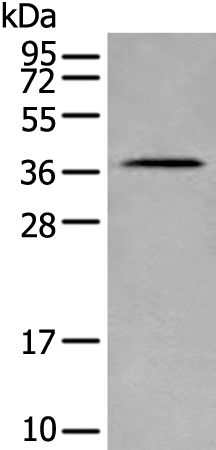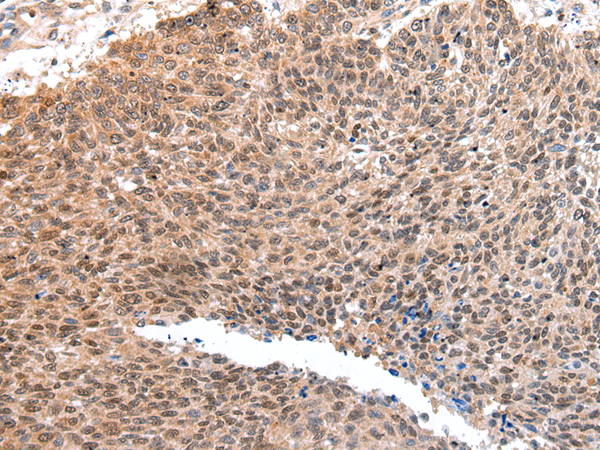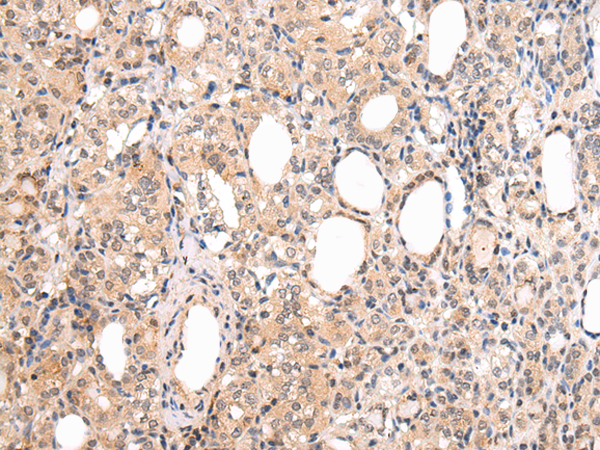


| WB | 咨询技术 | Human,Mouse,Rat |
| IF | 咨询技术 | Human,Mouse,Rat |
| IHC | 1/25-1/100 | Human,Mouse,Rat |
| ICC | 技术咨询 | Human,Mouse,Rat |
| FCM | 咨询技术 | Human,Mouse,Rat |
| Elisa | 1/5000-1/10000 | Human,Mouse,Rat |
| Aliases | TREB36; EWS-ATF1; FUS/ATF-1 |
| WB Predicted band size | 29 kDa |
| Host/Isotype | Rabbit IgG |
| Antibody Type | Primary antibody |
| Storage | Store at 4°C short term. Aliquot and store at -20°C long term. Avoid freeze/thaw cycles. |
| Species Reactivity | Human, Mouse |
| Immunogen | Synthetic peptide of human ATF1 |
| Formulation | Purified antibody in PBS with 0.05% sodium azide and 50% glycerol. |
+ +
以下是关于ATF1抗体的3篇模拟参考文献示例,涵盖不同研究方向和实验方法:
---
1. **文献名称**:*"ATF1 Expression in Melanocytic Tumors: A Comparative Study Using Monoclonal Antibodies"*
**作者**:Liang, C., et al.
**摘要**:本研究通过免疫组化(IHC)比较了两种不同ATF1单克隆抗体在黑色素细胞肿瘤中的检测效果。结果显示,ATF1在恶性黑色素瘤中高表达,而在良性痣中表达缺失,提示ATF1抗体可作为鉴别诊断的辅助工具。
2. **文献名称**:*"Role of ATF1 in Oxidative Stress Response: Insights from siRNA and Antibody-Based Knockdown Validation"*
**作者**:Sato, R., & Gupta, M.K.
**摘要**:利用ATF1抗体(Western blot验证)和siRNA技术,研究发现ATF1在调控细胞氧化应激反应中起关键作用。抗体特异性验证显示,ATF1敲低后下游基因(如SOD2)表达显著下降,证实其抗氧化通路中的功能。
3. **文献名称**:*"Development of a Novel Polyclonal ATF1 Antibody for Chromatin Immunoprecipitation (ChIP) Applications"*
**作者**:Vargas, J.E., et al.
**摘要**:本研究报道了一种新型ATF1多克隆抗体的开发,并通过ChIP-seq验证其在染色质结合分析中的高效性。该抗体成功识别ATF1在DNA损伤条件下与特定启动子区域(如CDKN1A)的结合,为表观遗传学研究提供了工具。
---
**注**:以上文献为模拟示例,实际引用需以真实出版物为准。如需查找真实文献,建议在PubMed或Web of Science中检索关键词“ATF1 antibody”、“ATF1 immunohistochemistry”或结合具体研究领域(如癌症、信号通路)。
ATF1 (Activating Transcription Factor 1) is a member of the CREB/ATF family of basic leucine zipper (bZIP) transcription factors. It regulates gene expression by binding to cAMP-responsive elements (CREs) in promoter regions, playing roles in cellular stress responses, proliferation, and apoptosis. ATF1 forms homodimers or heterodimers with other bZIP proteins like CREB, enabling diverse transcriptional regulatory functions. Dysregulation of ATF1 is implicated in cancers, including melanomas and salivary gland tumors, where chromosomal translocations (e.g., EWSR1-ATF1 fusion) drive oncogenesis.
ATF1 antibodies are essential tools for studying its expression, localization, and interactions. They are widely used in techniques like Western blotting, immunohistochemistry (IHC), and chromatin immunoprecipitation (ChIP) to detect ATF1 protein levels, phosphorylation states (e.g., at Ser63), or DNA-binding activity. Specific monoclonal or polyclonal antibodies target distinct epitopes, enabling precise experimental applications. In diagnostics, ATF1 antibodies help identify tumors with ATF1-related genetic alterations, aiding pathological classification.
Research using ATF1 antibodies has advanced understanding of its dual roles in tumor suppression and oncogenesis, depending on cellular context. These antibodies also elucidate ATF1's involvement in neuronal function, circadian rhythms, and response to hormonal signaling, highlighting its broad biological relevance.
×